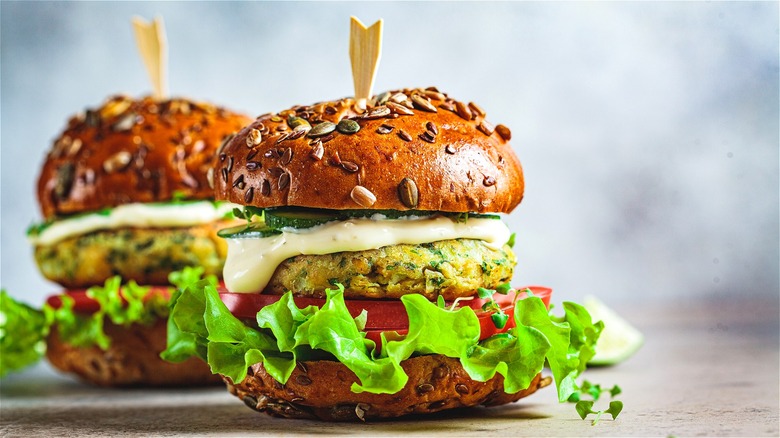The Veggies You're Using Are Likely To Blame For Mushy Vegan Burgers
In deciding to make your own veggie burger, after cooking for what feels like hours, you finally approach that crucial moment of conducting the ultimate veggie burger taste test. One bite in and you realize the texture of your veggie-loaded burger is undesirable: the beans, quinoa, and veggie mixture simply dissolves against the structured halves of that whole wheat bun. What caused your homemade vegan burger to lose its shape and turn to mush?
As it turns out, you may need to carefully consider the vegetables you're choosing before making a homemade plant-based burger. If you're constantly running into a structural issue, you may need to either choose firmer vegetables or make sure the water content of your nutritious produce is first cooked down before being added to your veggie-burger mix. Before getting into additional factors to consider when making homemade vegan burgers, beyond cooking out the excess water in various types of squash and mushrooms, there is another important reason why pre-cooking vegetables is essential when preparing delicious veggie burgers.
The vegetables with high moisture content
Veggie burgers usually pack a lot of flavor and texture, which lead them to be considered one of many vegan recipes that will make you want to go plant-based. Yet, as stated above, certain vegetables recommended in many veggie burger recipes contain a high level of moisture, which may impact the final structure of your burgers. Specifically, if your burger recipe calls for zucchini, mushrooms, or eggplant, you may want to cook these varieties down before adding them to any other ingredients. Spinach, broccoli, and cauliflower are also vegetables with high water content, so besides precooking these vegetables to ward off any excess water, a little extra preliminary cook time may add flavor to your resulting meal.
Precooking veggies before adding them to your veggie burger mix adds an enormous boost of flavor, thanks to the complex flavors and aromas being released in the cooking process. Onions alone are considered one of many aromatic vegetables. By sauteing in a small amount of fat, these crisp veggies release a more nuanced flavor and blend well with the other suggested ingredients in your vegan burger recipe. Now that you know why cooking out excess moisture not only helps stabilize the texture of your veggie burger but also the flavor, let's reveal other ways you can experience guaranteed success with future homemade veggie burgers.
Other factors to consider when making vegan burgers at home
Whether you're making a spicy black bean burger with roasted corn relish or your own personally crafted recipe, keeping your vegetables in check isn't the only component worthy of extra attention in the veggie burger-making process. There are so many different ways to create a delicious vegan burger, how do you keep track of all the necessary ingredients? If you're trying to make your own homemade recipe, The Cookful showcases a specific formula when choosing ingredients for veggie burgers. By combining 2 cups of cooked vegetables with 1 ½ cups of cooked beans or lentils and 1 cup of prepared grains, such as quinoa or rice, you should be on your way to one texturally satisfying veggie burger. From here, equal parts of flavor additions, such as nuts or olives, combined with a dry base, like oats and enough spices, should round out these vegetable-packed patties.
If you're not into using flax and chia seeds or tahini as flavor binders, Lukas Volger, author of "Veggie Burgers Every Which Way" tells First We Feast to try cornstarch or cooked mashed potato as a binder for your vegan burgers. Whichever ratio of ingredients you decide to follow, make it a future habit to precook your veggies to remove unnecessary moisture and also add a concentrated dose of flavor to your homemade plant-based burgers.


